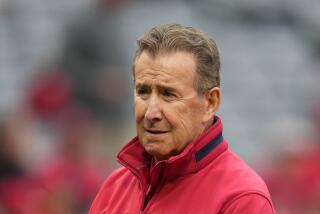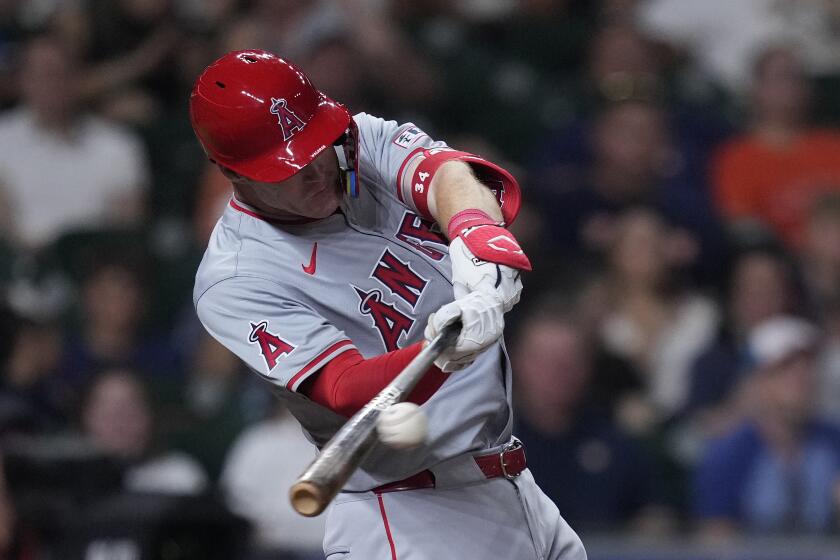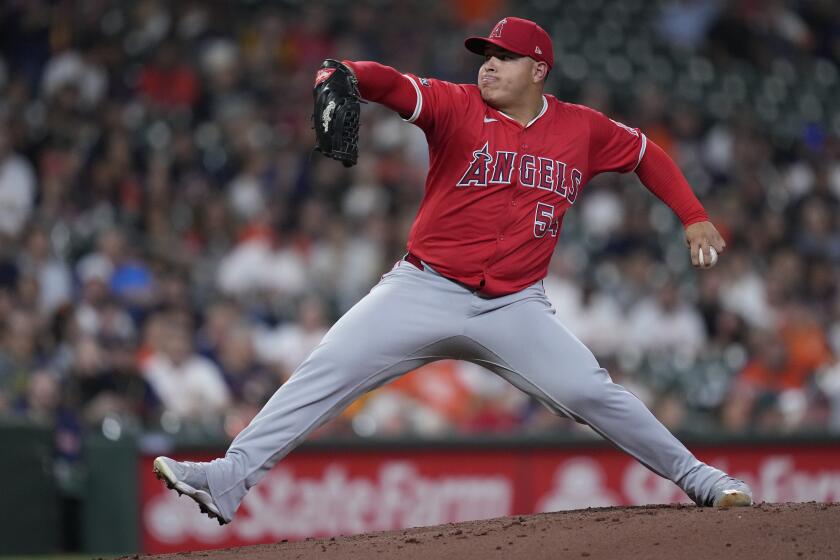Crowded Table as Negotiations Resume Today : Baseball: Several dozen players, representatives of owners are expected to attend, but there is little hope.
Prodded by federal mediators, baseball’s collective bargaining will resume today. Will it go beyond today? Is there anything new to discuss?
Only if owners withdraw the salary cap that has polarized the sides and shut down negotiations since the strike by major league players began on Aug. 12.
On Day 12 of the strike Tuesday, there was some seeming flexibility offered by Boston Red Sox CEO John Harrington regarding the owners’ willingness to look at alternatives, but no firm indication that the cap is coming off--either today or in the near future.
Harrington, the moderate CEO of the big-market Red Sox and spokesman for the owners’ pool, was asked if the owners are prepared to let go of the cap.
“Not at this time,” he said. “We still feel it’s in the best interest of the game.”
He said the owners remain united behind the need for change in the compensation system and keep hoping and waiting for the union to respond to their proposal.
He added, however, that if the union has better ideas there are “no limits” to the owners’ willingness to discuss alternatives.
“There’s absolutely no way we’ll go for a salary cap, but get rid of it and we’ll talk about anything,” said Dodger player representative Brett Butler, one of 18 players who met with four mediators after the mediators had met with the pool of 12 owners and club executives.
In response to a request by owners negotiator Richard Ravitch, mediators agreed to let all 12 attend today’s negotiations, a decision that drew no objection from the players union, which might have twice as many players and has been eager to confront the owners.
“It should be a rich mix,” said John Calhoun Wells, national director of the Federal Mediation and Conciliation Service in reference to the crowded table.
Both Ravitch and Donald Fehr, the union’s executive director, expressed hope that a dialogue can accelerate a settlement, but there were no promises.
“We’ve heard rumors that the owners might have a second proposal,” Kansas City Royal pitcher David Cone said. “That’s the kind of thing we’re looking forward to finding out.”
A second proposal?
“Clearly not,” acting commissioner Bud Selig said from Milwaukee. “The only thing you may have been hearing is that we have cost problems that have to be dealt with, and revenue sharing (without the cap) isn’t enough. If the union has any devices for dealing with the problems, we’ll be happy to discuss them. That’s all anyone is saying.”
Said Ravitch, when asked if the cap was still on the table: “I’m not going to comment on that, but I don’t want to suggest by my silence that the proposal has changed. It’s fair to say the owners have not changed their view on the need for cost certainty.”
The union recently presented the owners a series of revenue-sharing alternatives without a cap and saw them rejected.
“If the alternative is a functional equivalent of a cap, we don’t draw the distinction,” said Fehr, who added that the owners are still tied to the historical baggage of previous negotiations--this is the eighth stoppage since 1972--and still attempting to put artificial limitations on a free market.
If there is a compromise in the stalemate, most believe it rests in the players’ willingness to eliminate or modify salary arbitration in exchange for earlier free agency and removal of the cap.
Fehr, however, said that’s not what the owners mean when they bring up alternatives. He says they are merely expressing a willingness to change the percentages of their proposal--they have offered the union 50% of all revenue--if the union will tell them what it wants.
Fehr has refused to provide an answer because it would be accepting the cap. He says a free market should determine what the players earn.
In the meantime, the union has sent a recently completed economic study of the industry to each of the clubs. The report, commissioned by the union, was done by Stanford economist Roger Noll and reaches the same conclusions as a 1985 study by Noll: The industry is not in the trouble the owners say it is.
Thus, the battle lines remain drawn as the season evaporates and Fehr and Ravitch continue to throw verbal darts at one another.
“I note Don said yesterday that he’s never seen me in a team picture,” Ravitch said. “Well, I’ve never seen him in uniform on a (bubble gum) card either. That’s not our job. We’re not players and we’re not owners. Don is a very capable negotiator and we’re here to facilitate a settlement.”
They will be accompanied by the players and owners today, but that doesn’t mean that a settlement is any closer.
More to Read
Go beyond the scoreboard
Get the latest on L.A.'s teams in the daily Sports Report newsletter.
You may occasionally receive promotional content from the Los Angeles Times.




